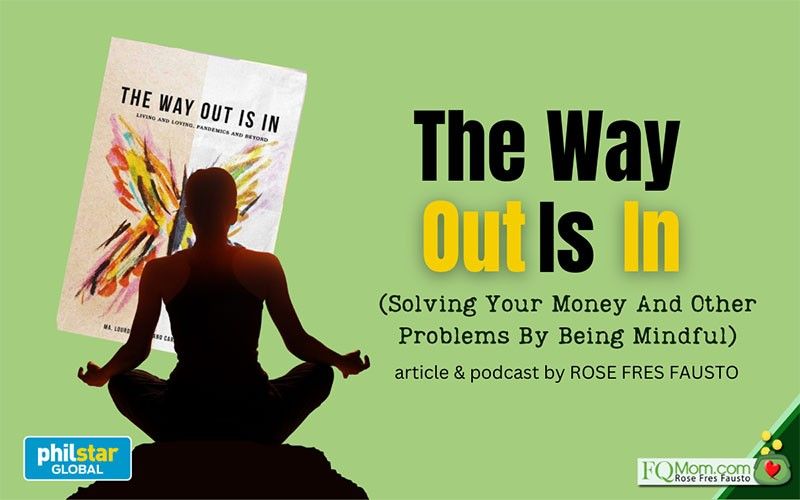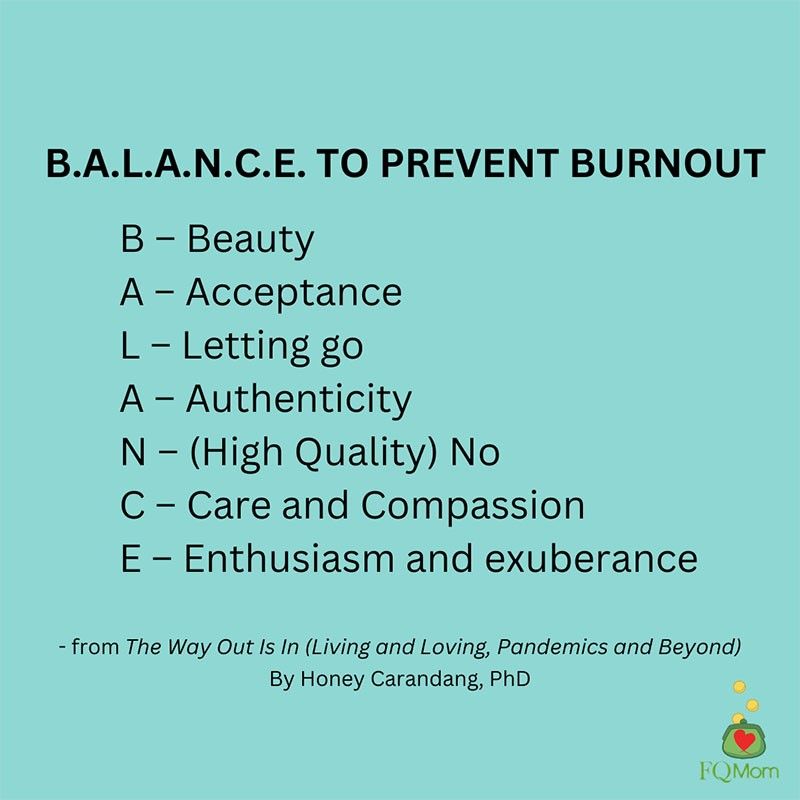The way out is in: Solving your money, other problems by being mindful


Last weekend, I attended the triple celebration event of our national social scientist, Honey Carandang, PhD at the Pinto Museum. It was her 80th birthday, the 13th anniversary of her MLAC Foundation, and the launch of her nth book titled “The Way Out Is In (Living and Loving, Pandemics and Beyond)”.
I first encountered Dr. Honey in the parenting talks I attended while my sons studied at Xavier School. Whenever she had a talk at school, I always attended it, no matter what the topic was, because I always came home with new lessons and insights. Fast forward to when I wrote my first book “Raising Pinoy Boys”. It was a wild dream for me to request her to write the foreword because we really didn’t know each other personally.
I raised my sons always reminding them, “You only have to ask,” that there was no point in being ashamed or embarrassed if you don’t get a yes to your request, for as long as you are not doing anything wrong. With this in mind, one afternoon, I was at the National Bookstore of Shangri-La Mall looking for books to buy. And lo and behold! Guess who was there too? It was Dr. Honey Carandang in the flesh. I introduced myself and we had a bit of a conversation. And I ended up asking her, “Would you be kind enough to look at my first book that I completed because I would love for you to write the foreword?” And I heard the most generous response, “Yes, send it over to me. I will read it on my way to Boston.” And the rest is my writing history.
For today’s article, I wish to discuss just a few points from her freshly published book. Although the book is not about money, I cannot help but pick up very valuable insights that are definitely applicable to the way we deal with money.
1. Intergenerational patterns or intergenerational traumas. We are all raised a certain way by our families. When we raise our own, we tend to follow the same patterns, most of the time, unconsciously. What struck me most about this discussion is this part: When as a young child, you did not feel the love of your mother, you did not see an unloving mother. You saw an unlovable child in yourself!
Being aware of the presence of this intergenerational patterns should prompt us to become pattern breakers.
This is the reason why in our FQ workshops, we start with an exercise on childhood money memory. This usually brings about both laughter and tears. Going down our childhood money memory lane allows us to understand the money script that is affecting the way we deal with money at the moment. Did you grow up hearing your parents quarrel about money? Did they always say that money is hard to earn and keep? Did you have rich relatives that you perceive as cruel? (To read more on this, click Childhood Money Memories and watch Childhood Money Memories Playlist.
2. The way out is in. So, what do you do now after you unearth your childhood money memory that made you behave in a certain way about money today? There is no point in pointing the blame to your parents, rich relatives, or your circumstances. The way out of a toxic relationship with money is to look inside yourself even more closely. Our next exercise is that of articulating your core values. Once you are able to do this, you are now in a position to use money as a tool to fulfill your core values. (To read more about this, click Core Values)
3. You are never back to square one! When we are recovering from grief or when we are on our way to achieving a goal, we sometimes experience a set-back. After doing all the steps to recover from grief and feeling better in the last few days, we may suddenly feel that same intense grief again. This may dishearten us that we’d say, “I am back to square one! It was all a waste.” But in Dr. Honey’s book and talk, she clarified that you are never back to square one. Yes, your body may feel the same intensity of grief but once you climb back up, you will not be in step one but in step 10. Nothing is wasted. The process is not linear. It does not come in a straight line.
I can’t help but see the parallelism to investing. Someone who started investing in the stock market 10 years ago and looks at his portfolio today might actually say, “I am back to square one, the Philippine Stock Index is still in the 6,000 levels where it was 10 years ago! It was a waste of time and money!” So, I will now borrow the words of Dr. Honey and say, “You are never back to square one! You have, at this point, developed the discipline of saving and investing regularly. You have experienced market ups and downs, tamed your emotional Emong and harnessed your makatwirang Mak to become a better investor!”
B.A.L.A.N.C.E. to prevent burnout
I wish to end this piece by sharing Dr. Honey’s acronym for balance and relating it to money matters.
B – is for Beauty. Be a beholder of beauty. It means seeking for it in the things around you. If you cannot be touched by beauty, then you are always in a hurry to get to your destination. That is not the way to live your life and neither is it the way to travel your FQ Journey. In the many steps towards our dream financial condition, we should pause to celebrate the beauty of the process, both the triumphs and challenges.
A – is for Acceptance. This is the best way you can be at peace. Without denying your own emotions, accept the way people are, the situation that you’re in. If you were not born rich, just remember that in life, we are dealt with different cards. Instead of blaming your parents, the government, and other things outside of you, figure out how you can reach your dreams given the cards you are dealt with.
L – is for Letting go. If you tend to cling to some things because they are familiar and comfortable, please stop doing so when they start to become harmful and hold you back from moving forward. Someone who may have been born with a silver spoon may refuse to downgrade his lavish lifestyle instead of finding ways to improve his sorry state of financials. Living in the past glory can bury someone in debt and stress.
A – is for Authenticity. Be real. Be who you are. It is exhausting to pretend. This is also integrity – being whole, solid. What you see on the outside is what is on the inside. With the onslaught of social media influence, it is easy for everyone to get lost and end up being clueless of the real self. When you reach a certain level of financial condition, you may be able to buy all the fancy stuff, and yet one day, you may just wake up feeling empty. Why? Because it is possible that you accumulated the wrong stuff – the material things that do not help you fulfill your core values. This is a common cause of midlife crisis. This is the reason why it is important to be very aware of your fundamental values. Because, if what you do with or for money does not align with your core values, no amount of money in this world will make you happy. (To know more about this, click Common Cause of Midlife Crisis)
N – is for High-Quality No. This is the well-thought-out and decisive no that is not angry but firm. This may be difficult in our culture that is very hospitable and compassionate, but there are times when we need to say no. Inability to do this is the reason why many Filipinos are caught in the sandwich generation (To read more on this, click Are you caught in the sandwich generation? (Or are you among the lucky ones?), why OFWs after decades of working hard abroad with all the loneliness and other sacrifices done, come back with little or nothing for their own retirement years.
C – is for Care and Compassion. It is being aware of the feelings of others. When you understand where a person is coming from, it is easier to have compassion. Since money is a tool to help others, it is important that you truly understand the people you are helping.
E – is for Enthusiasm and Exuberance. Do things joyfully, even in the most difficult circumstances. There is joy in the things that are right in front of you that seem so simple. If you practice the art of spotting joy, you can find enthusiasm in your job, including the mundane aspects of it. This way, you do not only see it as your source of livelihood but as your source of a joyful life. Moreover, a job that’s joyfully performed brings in promotions, higher income, and other recognitions.

I hope the above insights help you become more mindful of your everyday life, because the way out of a crazy world is really getting into yourself more closely.
Cheers to a mindful and high FQ!
ANNOUNCEMENTS
1. If you want to know where you are in your FQ journey. Click here.

2. If you want to know your FQ, buy our books. Click here.

3. I wish to share once more the interviews I did with Dr. Honey Carandang:
a. FQwentuhan with Dr. Honey Carandang
b. #LiveAtFive with Dr. Honey Carandang (Taking care of our Mental Health during this pandemic) Part 1
c. #LiveAtFive with Dr. Honey Carandang (We answer your questions on Mental Health) Part 2
d. Road to a Richer Life



















